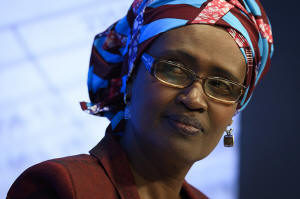HIV infections could jump over 6 times if US support is dropped and not
replaced, UNAIDS chief says
 Send a link to a friend
Send a link to a friend
 [February 11, 2025]
By MARIA CHENG [February 11, 2025]
By MARIA CHENG
LONDON (AP) — The head of the U.N. AIDS agency said Monday the number of
new HIV infections could jump more than six times by 2029 if American
support of the biggest AIDS program is dropped, warning that millions of
people could die and more resistant strains of the disease could emerge.
In an interview with The Associated Press, UNAIDS Executive Director
Winnie Byanyima said HIV infections have been falling in recent years,
with just 1.3 million new cases recorded in 2023, a 60% decline since
the virus peaked in 1995.
But since President Donald Trump’s announcement the U.S. would freeze
all foreign assistance for 90 days, Byanyima said officials estimate
that by 2029, there could be 8.7 million people newly infected with HIV,
a tenfold jump in AIDS-related deaths — to 6.3 million — and an
additional 3.4 million children made orphans.
“We will see a surge in this disease,” Byanyima said, speaking from
Uganda. “This will cost lives if the American government doesn’t change
its mind and maintain its leadership,” she said, adding that it was not
her place to criticize any government’s policy.
Byanyima pleaded with the Trump administration not to abruptly cut off
funding, which she said has resulted in “panic, fear and confusion” in
many of the African countries hardest hit by AIDS.

In one Kenyan county, she said 550 HIV workers were immediately laid
off, while thousands of others in Ethiopia were terminated, leaving
health officials unable to track the epidemic.
She noted that the loss of U.S. funding to HIV programs in some
countries was catastrophic, with external funding, mostly from the U.S.,
accounting for about 90% of their programs. Nearly $400 million goes to
countries like Uganda, Mozambique and Tanzania, she said.
“We can work with (the Americans) on how to decrease their contribution
if they wish to decrease it,” she said. Byanyima described the American
withdrawal from global HIV efforts as the second biggest crisis the
field has ever faced — after the years-long delay it took for poor
countries to get the lifesaving antiretrovirals long available in rich
countries.
[to top of second column]
|

Winnie Byanyima, Executive Director of Oxfam International,
attends the 47th annual meeting of the World Economic Forum, WEF, in
Davos, Switzerland, Thursday, Jan. 19, 2017. (Gian Ehrenzeller/Keystone
via AP, File)
 Byanyima also said the loss of
American support in efforts to combat HIV was coming at another
critical time, with the arrival of what she called “a magical
prevention tool” known as lenacapavir, a twice-yearly shot that was
shown to offer complete protection against HIV in women, and which
worked nearly as well as for men.
Widespread use of that shot, in addition to other interventions to
stop HIV, could help end the disease as a public health problem in
the next five years, Byanyima said.
She also noted that lenacapavir, sold as Sunlenca, was developed by
the American company Gilead.
International aid, Byanyima said, “helped an American company to
innovate, to come up with something that will pay them millions and
millions, but at the same time prevent new infections in the rest of
the world.” The freeze in American funding, she said, didn’t make
economic sense.
“We appeal to the U.S. government to review this, to understand that
this is mutually beneficial,” she said, noting that foreign
assistance makes up less than 1% of the overall U.S. budget. “Why
would you need to be so disruptive for that 1%?”
Byanyima said that so far, no other countries or donors have stepped
up to fill the void that will be left by the loss of American aid,
but that she plans to visit numerous European capitals to speak with
global leaders.
“People are going to die because lifesaving tools have been taken
away from them,” she said. “I have not yet heard of any European
country committing to step in, but I know they are listening and
trying to see where they can come in because they care about rights,
about humanity.”
All contents © copyright 2025 Associated Press. All rights reserved
 |